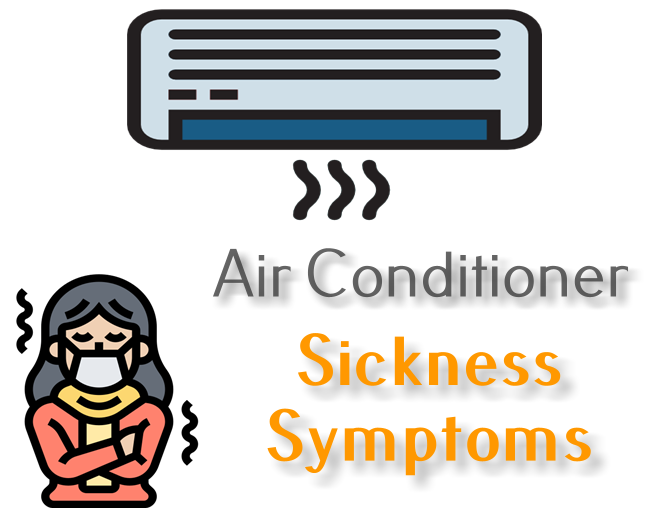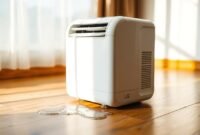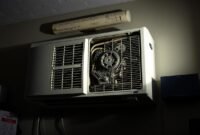In today’s modern world, air conditioning has become an essential part of our lives. We rely on air conditioners to keep us cool and comfortable during hot summer days, whether at home, in the office, or in public spaces.
However, while air conditioning relieves the sweltering heat, it’s essential to be aware of the potential health risks associated with prolonged exposure to air conditioning. Therefore, you should learn the common symptoms to address the issue.
Air Conditioner Sickness Symptoms
Can air conditioning make you sick? Yes, prolonged exposure to air conditioning can make you sick. While air conditioning is not inherently harmful, certain factors associated with its use can contribute to developing health issues. Here are some common symptoms of air conditioner sickness:

● Cold or Allergy-like Symptoms
Prolonged exposure to air conditioning can cause dry air, which may lead to nasal congestion, sneezing, coughing, and a runny nose.
Read also: What Causes Air Conditioner Humming Inside?
● Breathing or Respiratory Issues
Dry air from ACs can irritate the respiratory system, causing coughing, wheezing, shortness of breath, or exacerbating respiratory conditions such as asthma.
● Dry, Itchy, or Flaky Skin
Air conditioners reduce humidity levels, resulting in dryness of the skin. This can cause itching, flaking, and general discomfort.
● Dry or Irritated Eyes
Reduced humidity in air-conditioned spaces can lead to dryness and irritation of the eyes, causing redness, itching, and a gritty sensation.
● Dehydration
ACs remove moisture from the air, contributing to an overall decrease in humidity. This can result in increased water loss from the body, leading to dehydration if adequate fluids are not consumed.
● Prolonged Headaches or Dizziness
Frequent exposure to cold air and temperature fluctuations can trigger tension headaches or migraines. The body’s adjustment to changing temperatures can also cause dizziness or lightheadedness.
● Increased Blood Pressure
According to some studies, the temperature can be temporarily raised when moving from a hot environment to a cold, air-conditioned space.
● Feeling Tired
Constant exposure to cold air can affect sleep quality and disrupt the body’s natural circadian rhythm, leading to fatigue and feeling tired throughout the day.
● Heat Intolerance
Prolonged periods in air-conditioned environments can decrease the body’s ability to adapt to higher temperatures, making individuals more sensitive to heat when they step outside.
Can Air Conditioning Cause Flu-like Symptoms?
Air-conditioned spaces, particularly those lacking regular maintenance, can become breeding grounds for bacteria, mold spores, and other pathogens. These contaminants, circulating through the heating, ventilation, and air conditioning (HVAC) system, can contribute to air conditioning sickness symptoms resembling the flu.
Breathing in contaminated air can weaken the immune system, making individuals more prone to respiratory infections and illnesses like colds or flu.
While air conditioners do not directly cause the flu, they can create conditions that may increase the risk of respiratory infections. Here’s why:
- Circulations of airborne germs throughout a closed space or room.
- Weakened immune response due to frequent exposure to cold air.
- Dry air from ACs can affect the protective mucus lining in the nose and throat, making it easier for viruses and bacteria to penetrate the body and cause infections.
Read also: Air Conditioner Whistling Noise
Side Effects of Air Conditioners on the Human Body
While your air conditioning unit provides relief from hot weather, it’s important to be aware of its potential side effects on the human body.
For instance, prolonged exposure to air conditioning can lead to sick building syndrome symptoms, especially if the unit is not regularly maintained and the air circulation is inadequate. Here are some side effects to consider:
- Dehydration, especially if individuals do not drink adequate water while exposed to air conditioning for long periods.
- Skin problems like dryness, itching, and irritation.
- Poor sleep quality because the constant exposure to cool air can interfere with the body’s ability to reach the ideal sleep temperature.
- Muscle stiffness and joint pain, especially for individuals who already have joint issues or suffer from conditions like arthritis.
- Impact on the respiratory system, especially in individuals with pre-existing respiratory conditions such as asthma or allergies.
While air conditioning offers respite from the heat, it’s essential to be mindful of its potential health effects on our bodies. Everyone’s sensitivity to ACs varies, and it’s critical to listen to your body and take necessary precautions to maintain your health.
To minimize the risks associated with air conditioning sickness symptoms, it’s recommended to maintain proper humidity levels in air-conditioned spaces. This can be achieved by regularly maintaining your air conditioning unit, ensuring that it functions efficiently and effectively, circulating room air.
Ensure regular cleaning and maintenance of air conditioning systems, practice good ventilation to improve indoor air quality, use skin moisturizers, and stay adequately hydrated.


